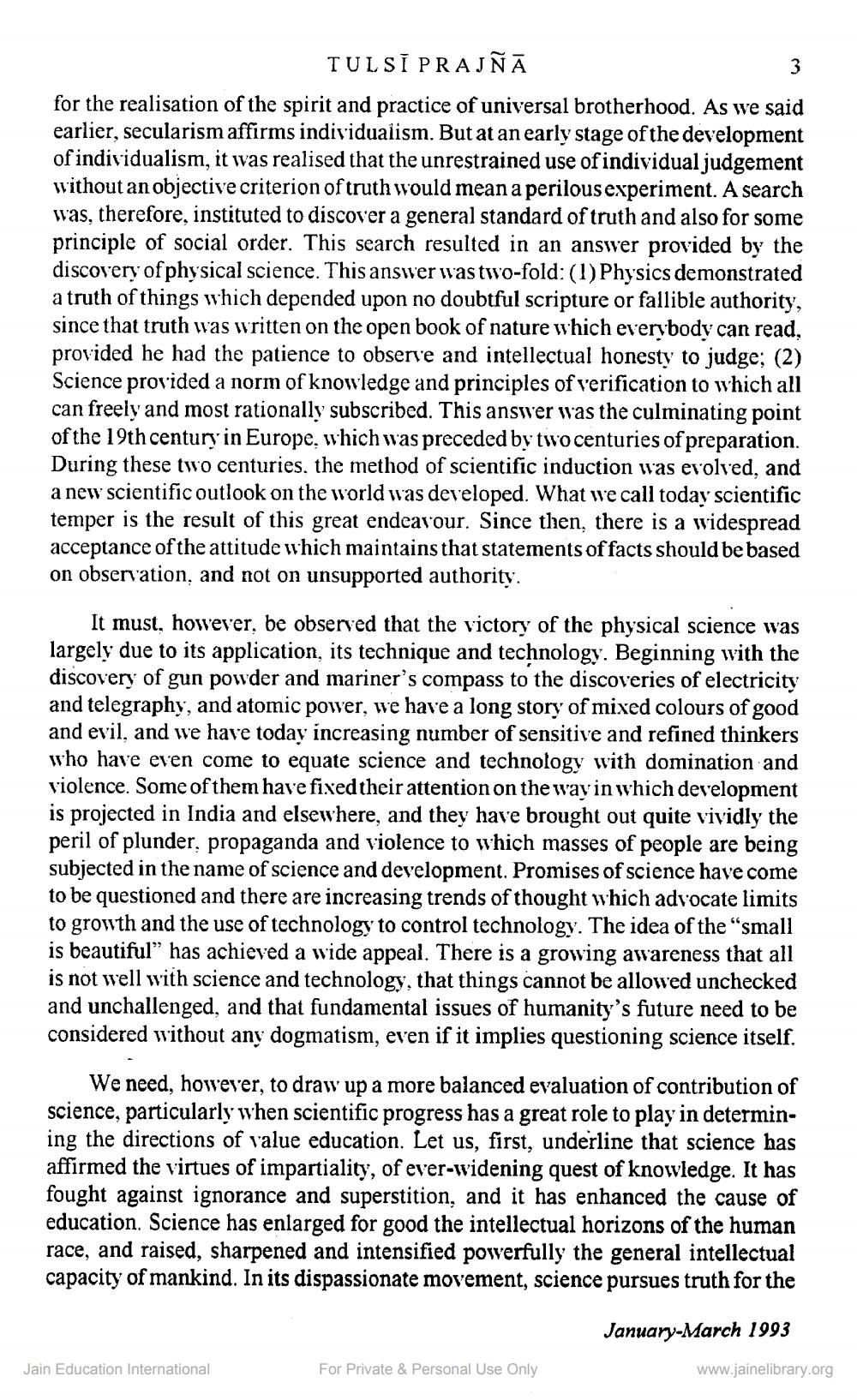Book Title: Tulsi Prajna 1993 01 Author(s): Parmeshwar Solanki Publisher: Jain Vishva Bharati View full book textPage 9
________________ TULSĪPRAJNA 3 for the realisation of the spirit and practice of universal brotherhood. As we said earlier, secularism affirms individualism. But at an early stage of the development of individualism, it was realised that the unrestrained use of individual judgement without an objective criterion of truth would mean a perilous experiment. A search was, therefore, instituted to discover a general standard of truth and also for some principle of social order. This search resulted in an answer provided by the discovery of physical science. This answer was two-fold: (1) Physics demonstrated a truth of things which depended upon no doubtful scripture or fallible authority, since that truth was written on the open book of nature which everybody can read, provided he had the patience to observe and intellectual honesty to judge; (2) Science provided a norm of knowledge and principles of verification to which all can freely and most rationally subscribed. This answer was the culminating point of the 19th century in Europe, which was preceded by two centuries of preparation. During these two centuries, the method of scientific induction was evolved, and a new scientific outlook on the world was developed. What we call today scientific temper is the result of this great endeavour. Since then, there is a widespread acceptance of the attitude which maintains that statements of facts should be based on observation, and not on unsupported authority. It must, however, be observed that the victory of the physical science was largely due to its application, its technique and technology. Beginning with the discovery of gun powder and mariner's compass to the discoveries of electricity and telegraphy, and atomic power, we have a long story of mixed colours of good and evil, and we have today increasing number of sensitive and refined thinkers who have even come to equate science and technology with domination and violence. Some of them have fixed their attention on the way in which development is projected in India and elsewhere, and they have brought out quite vividly the peril of plunder, propaganda and violence to which masses of people are being subjected in the name of science and development. Promises of science have come to be questioned and there are increasing trends of thought which advocate limits to growth and the use of technology to control technology. The idea of the "small is beautiful" has achieved a wide appeal. There is a growing awareness that all is not well with science and technology, that things cannot be allowed unchecked and unchallenged, and that fundamental issues of humanity's future need to be considered without any dogmatism, even if it implies questioning science itself. We need, however, to draw up a more balanced evaluation of contribution of science, particularly when scientific progress has a great role to play in determining the directions of value education. Let us, first, underline that science has affirmed the virtues of impartiality, of ever-widening quest of knowledge. It has fought against ignorance and superstition, and it has enhanced the cause of education. Science has enlarged for good the intellectual horizons of the human race, and raised, sharpened and intensified powerfully the general intellectual capacity of mankind. In its dispassionate movement, science pursues truth for the Jain Education International For Private & Personal Use Only January-March 1993 www.jainelibrary.orgPage Navigation
1 ... 7 8 9 10 11 12 13 14 15 16 17 18 19 20 21 22 23 24 25 26 27 28 29 30 31 32 33 34 35 36 37 38 39 40 41 42 43 44 45 46 47 48 49 50 51 52 53 54 55 56 57 58 59 60 61 62 63 64 65 66 67 68 69 70 71 72 73 74 75 76 77 78 79 80 81 82 83 84 85 86 87 88 89 90 91 92 ... 156
